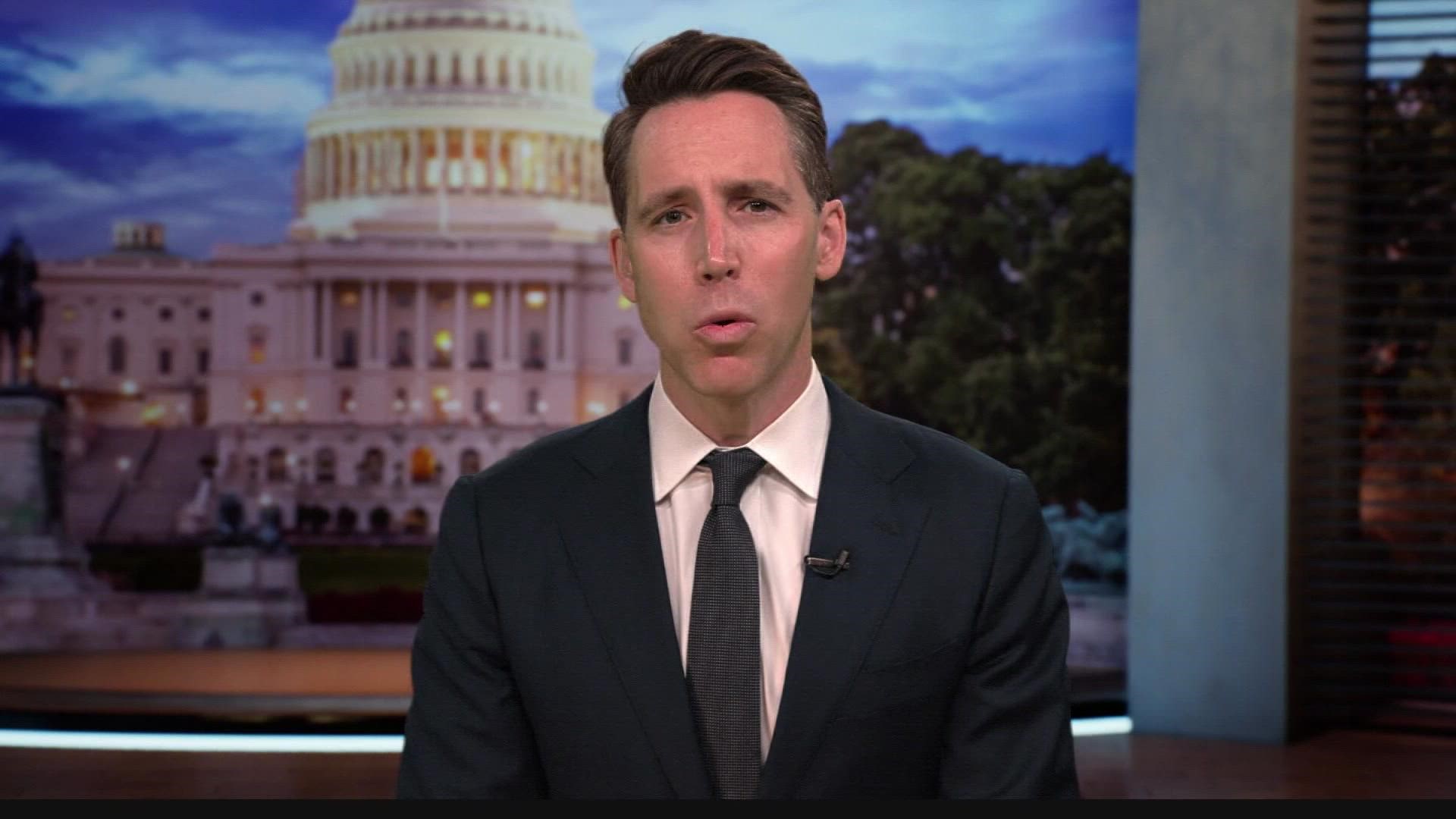ST. LOUIS, Missouri — As bipartisan members of Congress on the Select Committee to Investigate the January 6th Attack on the United States Capitol prepared to reveal its findings to a prime-time audience on Thursday night, Senator Josh Hawley (R-MO) defended his behavior on that decisive day.
During the Thursday night hearings, the public will get its first look at new evidence underlying the strategy behind the scenes that led to the violent rush on the Capitol as Congress certified President Biden's victory.
Members of the committee will lay out their opening arguments in the prosecution of a former president and his inner circle's plot to overthrow and disrupt the peaceful transfer of power.
Hawley has said when he was photographed raising his fist toward the throng of protesters who were about to storm the Capitol that he wasn't advocating or supporting violence.
Later, speaking from the floor of the Senate that night, he condemned the mob violence with his words, but in an interview nearly a year and a half later, Hawley again endorsed their mission — to overthrow and obstruct the peaceful transfer of power — just in a more polite fashion. Instead of an angry, violent mob, Hawley argued lawyers, judges, and politicians should be the ones to second-guess or potentially reverse the will of the public.
"There's all kinds of problems that happened in Pennsylvania," Hawley said. "And by the way, none that's fraud. All of that is their own process. And all of it really comes back to an elected Supreme Court. It's a partisan court is not appointed judges. These are elected judges, a partisan court, that ruled on a partisan basis to make decisions that benefited Joe Biden."
In its opinion refusing to overturn the election results or throw out ballots, the Pennsylvania Supreme Court pointed out it was Republicans in the majority who voted to expand mail-in balloting. In fact, some of the very same legislators who petitioned the court had already won election and re-election under those same new voting laws. The court noted that they only turned around to challenge the election laws they wrote after the count didn't go Trump's way.
The opinion said, "Courts should not decide elections when the will of the voters is clear."
When asked if the will of the voters in 2020 was clear to him, Hawley dodged the question and blamed the courts, not the Republican legislators who wrote the election law in question.
"If you want to get people upset about the voting rules and questioning election integrity, that's the way to do it is to change the rules by fiat during an election," Hawley said.
In fact, the laws were changed through the legislature, not "by fiat."
"They were wrong to do that," Hawley went on. "I agree with [U.S. Supreme Court] Justice [Clarence] Thomas who thinks that the U.S. Supreme Court should have reviewed this for a possible violation of the U.S. Constitution. I think he was right about that. And I stand by my objection."
In his dissent, Justice Thomas wrote that the Pennsylvania legislature's move to expand mail-in balloting "does not appear to have changed the outcome in any federal election."
Despite that well-established fact, one of the most revealing findings unearthed by the January 6th committee was that Thomas's own wife, Ginni Thomas, texted President Trump's chief of staff Mark Meadows and urged him not to concede defeat. Those are the kinds of text messages the January 6th committee could reveal in the hearings which are scheduled over the next few weeks.
"In Pennsylvania, there was no chain of custody," Hawley said. "The Supreme Court changed the rules on when the ballots could be sent in, how they could be counted. When they were cast, we just don't know."
When Hawley was asked directly if he had seen any evidence that would persuade him Pennsylvania's election results were off by more than 80,555 votes, he could not say yes.
"I don't think we'll ever know," he said. "I mean, because there are tens of thousands of ballots that were returned after the fact that the Pennsylvania Supreme Court allowed to be counted."
Several states allow ballots that were mailed before or on election day to be legally counted as long as they arrive at their destination before the deadline.
"We don't know about the provenance of those ballots," Hawley said. "We have the mail-in balloting law, which a Pennsylvania court has said does not comply with the state's own constitution, which governs the entire election. So that would be all ballots cast."
Of course, Pennsylvania election officials do know where each ballot originated from. Each legally cast ballot traces back to an eligible voter and can be checked against current voter rolls, signatures, and other identifying information.
Yet, still, Hawley called every ballot cast in Pennsylvania into question — not because he has evidence of fraud, but because he doesn't like the way the Republican-led majority in the state legislature changed the voting laws during a deadly pandemic.

